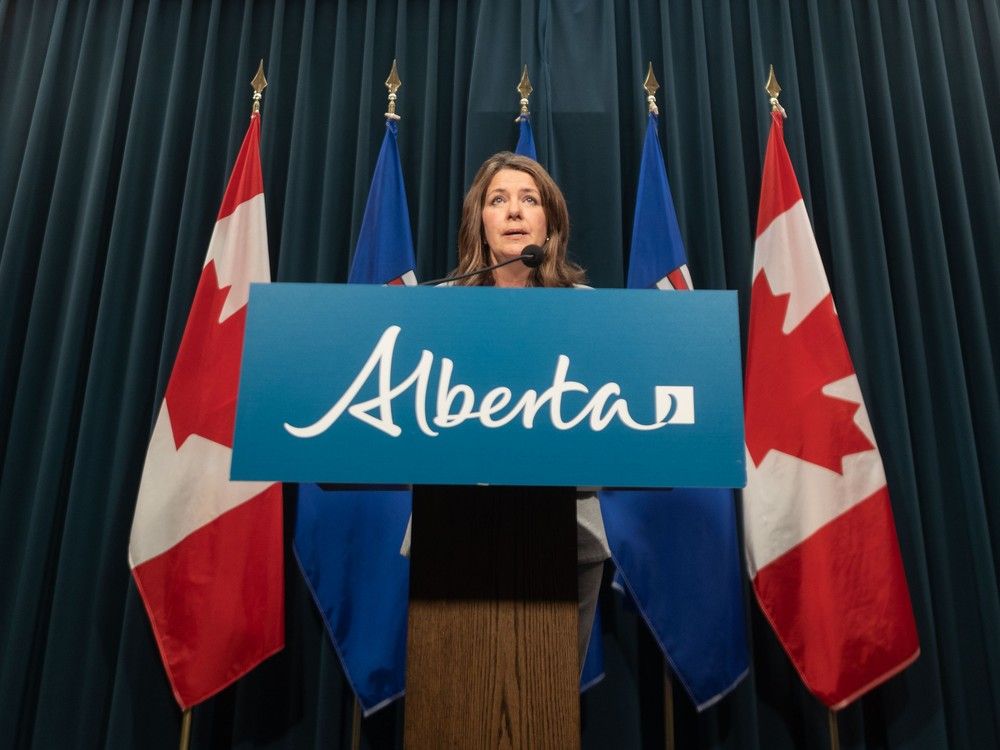
Bennett Jensen, legal director at Egale Canada, told Postmedia Thursday that the policies are “clearly unconstitutional”
Criticism that Alberta was going too far in its crusade for “parental rights” came swiftly from across the country after a package of proposals were first detailed by Premier Danielle Smith in a video posted to social media on Wednesday afternoon, including bans on gender-affirming medical treatment for those aged 17 and under, and on hormone therapy for children aged 15 and under — except for those who have already begun therapy.
Her United Conservative government is also promising to introduce legislation and regulations in the fall that will require parental consent before children 15 and under can go by their chosen name or pronoun, and an opt-in requirement for formal gender identity, sexual orientation, or human sexuality education.
Smith also promises to limit how transgender athletes can compete in sports.
Bennett Jensen, legal director at Egale Canada, told Postmedia Thursday that the policies are “clearly unconstitutional,” and, in partnership with trans advocacy group Skipping Stone Foundation, they will be taking legal action.
“It appears to be a systematic attempt to eradicate trans people from existence, at least from public society,” said Jensen, noting that many aspects are unconstitutional and will stigmatize trans people.
“The harm from that will put us possibly decades back in terms of inclusion and acceptance and safety,” said Jensen.
At an afternoon news conference Thursday, Smith focused on the province aiming to attract a specialist to offer medical services so individuals don’t have to travel to Quebec to get surgery, and that restrictions on children’s access are about protecting young people from making irreversible choices.
In Saskatchewan, the government’s move last year to require parental consent for changes to kids’ names or pronouns in school drew a court challenge. Premier Scott Moe’s government invoked the notwithstanding clause, which allows a province to override the Charter of Rights and Freedoms for five years.
When asked about the possibility of having to invoke the notwithstanding clause to go against the Charter of Rights and Freedoms, Smith said, “I hope it doesn’t come to that.”
“We know that we have to preserve the rights of kids to be able to make decisions as adults,” said Smith, adding that child protective services can support children in abusive households.
New Brunswick introduced a similar requirement last year. Provincial child and youth advocates in Saskatchewan and New Brunswick spoke out publicly against the policies, and on Thursday, Alberta’s child and youth advocate Terri Pelton released a statement emphasizing that “the lives of vulnerable young people are at stake.”
Ahead of Smith’s announcement in Alberta, teachers and parents’ school councils said they were not consulted, although Smith said Thursday she’s been influenced by members of the trans community.
David Oulton, a Calgary-based broadcaster who identifies as a gay conservative, told Postmedia Thursday he was adopted in his teens because he grew up in an abusive household, and supports the policies.
“There are bad parents. No policy is going to change that,” said, arguing Smith’s proposals can help kids, and put appropriate safeguards in place.
“It forces the conversation and it forces transparency,” he said.
NDP Opposition Leader Rachel Notley, speaking at a news conference in Ottawa, said the moves actively discriminate against transgender people, the LGBTQ community, and children who deserve sexual education.
“Smith’s new policy represents government interference in what should be a collaborative and private decision between parents, their child and their doctor. Current practice in Alberta is guided by the rules of the Canadian Medical Association and necessarily includes parents,” said Notley, who added that the court will have the final say on Smith’s proposals.
Anna Murphy said the “draconian” policies will have a devastating impact on the LGBTQ population across the province.
“Growing up in rural Alberta, no one told me, no one forced me, no one groomed me to be transgender,” she said.
Cheryl Milne, executive director of the Asper Centre for Constitutional Rights at the University of Toronto faculty of law, questioned why Alberta is proposing the policy when speaking with Postmedia.
“When you carve out a particular kind of treatment, and say that young people, regardless of their capacity to make their own decisions, are not allowed to do that, then you are definitely, I think, discriminating, particularly if that treatment is related to a ground of discrimination,” she said.
“I can’t see how this is really about protecting young people. It’s really hard to understand why there has to be this overarching government policy that covers schools and health care for a very tiny group of people who are being treated by medical practitioners who know what they’re doing,” said Milne.
“It’s a really unfortunate situation that we’ve seen this kind of contagion with other provinces,” said Milne, noting that such policies are contrary to the United Nations convention on the Rights of the Child.



